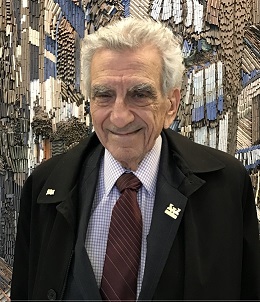
STEPPING UP TO CHALLENGES
Born and raised in the city of Detroit, George Ritter, M.D., knew he wanted to be a doctor when he was in the sixth grade. To fulfill this dream, he attended the College of Liberal Arts and Sciences at Wayne State University, earning a degree in biological sciences in 1942, and then enrolling in the School of Medicine.
After receiving his medical degree in 1945, he was inspired by School of Medicine faculty member and Chief of Medicine at Detroit Receiving Hospital, Gordon Myers, M.D., to pursue the specialty of Cardiology.
"I love challenges, and the way Dr. Myers explained cardiology got me very interested. It had a certain degree of engineering that really interested me."
During his career as a cardiologist, Dr. Ritter has been a committed educator and pioneer. When cardiopulmonary resuscitation was first introduced in the early 1960s, he traveled throughout lower Michigan, teaching physicians how to perform the new technique. He was also instrumental in the development of the first paramedic system in Michigan when he helped train an initial group of Southfield firefighters in basic medical emergency response procedures. The revolutionary use of CPR and the training of mobile response units to use it greatly improved patient care and survivability, and the practices were swiftly implemented across the country as standard practice.
Dr. Ritter's dedication to medical instruction and innovation led him to become a steadfast and passionate School of Medicine professor, volunteer and philanthropist.
ENSURING THE FUTURE OF MEDICINE IN DETROIT
In 1951, after serving two years in the U.S. Army as a captain at Fitzsimons General Hospital in Denver, Colo., and two and a half years at the Veterans Administration Hospital in Allen Park, Mich., Dr. Ritter returned home and devoted himself to private practice and to the School of Medicine. He taught as a clinical associate professor at the school from 1955 to 1975, and currently serves as an honorary member of the School of Medicine Alumni Association Board of Governors.
His philanthropic support has been motivated by his personal experiences as an intern and educator. In 2013, Dr. Ritter established the Mary and George Ritter Endowed Scholarship to help reduce the tuition barrier to high-quality medical education and increase the number of comprehensively-educated doctors.
"I could not believe some of the things, the trauma, I saw while I was an intern. It is still something that keeps me involved with the School of Medicine today," he said. "The need has not gone away. We need more doctors trained at Wayne State who can provide the clinical care needed in places like Detroit."
Dr. Ritter intends this scholarship to provide the financial freedom that allows medical students to remain focused on their studies.
"It's almost impossible to go to medical school and work at the same time. I remember during my time in medical school, some people I knew tried to study, go to lectures and work at the foundry, and their education suffered for it," he said. "Students who can devote all of their time to studying become better doctors, and I want to do my part to help with that."
THE WAYNE DISTINCTION
The distinct training offered by the School of Medicine bolsters Dr. Ritter's confidence in the impact of his gift. Throughout his career, he has encountered countless doctors and medical students, and can see the difference that Wayne State University provides.
"Doctors trained at Wayne are more people-oriented. They treat the person, not just the disease or physical problem. The distinction is very important for physicians to understand, and Wayne State does an excellent job at training students to practice this way."
With 1,200 medical students currently enrolled, the School of Medicine is grateful for Dr. Ritter's philanthropic partnership in support of scholarship during the Pivotal Moments campaign. His contribution addresses the challenge of rising costs for medical education and helps students succeed in becoming the expert and compassionate physicians of tomorrow.